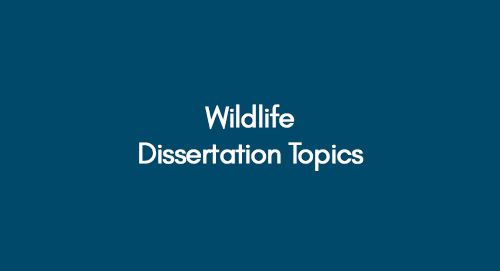Topic 1: Analysing Predicting Biodiversity Risks in Changing Environments: A Comprehensive Analysis of Habitat Loss, Climate Change, and Human Impact
Research Aim: This dissertation aims to develop an integrated framework for predicting biodiversity risks, investigating the synergistic effects of habitat loss, climate change, and human impact on wildlife populations. The study seeks to assess and model potential biodiversity threats, providing actionable insights for conservation strategies. Employing a multidisciplinary approach, the research will utilize remote sensing, GIS mapping, and statistical modeling to analyze large-scale biodiversity datasets, facilitating a holistic understanding of the complex interactions influencing wildlife vulnerability.
Topic 2: Harnessing Environmental DNA (eDNA) for Biodiversity Monitoring and Habitat Assessment: Revolutionizing Wildlife Conservation
Research Aim: This dissertation aims to explore the transformative potential of Environmental DNA (eDNA) in wildlife conservation, focusing on its application for biodiversity monitoring and habitat assessment. The study seeks to evaluate the effectiveness of eDNA techniques in detecting and monitoring elusive species, understanding ecosystem dynamics, and informing conservation management. Employing a combination of eDNA sampling, DNA metabarcoding, and bioinformatics analysis, the research will contribute to advancing non-invasive and efficient wildlife conservation practices.
Topic 3: Assessing the Blockchain Technology for Transparent and Decentralized Wildlife Management
Research Aim: This dissertation aims to investigate the potential of blockchain technology in enhancing transparency, traceability, and decentralization within wildlife conservation efforts. The study seeks to assess how blockchain can contribute to combating illegal wildlife trade, ensuring data integrity in conservation initiatives, and fostering trust among stakeholders. Employing a mixed-methods approach, the research will combine blockchain implementation, data analysis, and stakeholder interviews to provide practical insights for the integration of blockchain in wildlife conservation strategies.
Topic 4: Fostering Biodiversity Through Regenerative Agriculture: A Holistic Examination of Ecological Restoration in Wildlife Habitats
Research Aim: This dissertation aims to explore the impact of regenerative agriculture practices on wildlife habitats, focusing on biodiversity enhancement and ecological restoration. The study seeks to evaluate the effectiveness of regenerative agriculture techniques in promoting habitat resilience, species diversity, and overall ecosystem health. Employing a combination of field surveys, ecological assessments, and data analytics, the research will provide valuable insights into the potential of regenerative agriculture as a conservation strategy for wildlife habitats.
Topic 5: Examining Sustainable Forest Management in 2024: Balancing Conservation, Harvesting, and Climate Resilience
Research Aim: This dissertation aims to assess the current state of forest management practices in 2024, focusing on their effectiveness in achieving a balance between wildlife conservation, sustainable harvesting, and climate resilience. The study seeks to identify emerging challenges and opportunities in contemporary forest management and propose strategies for optimizing conservation outcomes. Through a comprehensive literature review, case studies, and stakeholder interviews, the research will provide insights into the evolving dynamics of forest management for wildlife conservation in the present context.




























